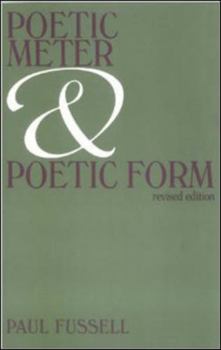Poetic Meter and Poetic Form
Select Format
Select Condition 
Book Overview
Excerpts from distinctive poems illustrate the author's appreciation of the metrical and formal aspects of poetryTitle: Poetic Meter and Poetic FormAuthor: Fussell, PaulPublisher: McGraw-Hill... This description may be from another edition of this product.
Format:Paperback
Language:English
ISBN:0075536064
ISBN13:9780075536062
Release Date:January 1979
Publisher:McGraw-Hill Education
Length:208 Pages
Weight:0.53 lbs.
Dimensions:0.5" x 5.4" x 8.3"
Customer Reviews
5 ratings
Masterful
Published by Thriftbooks.com User , 17 years ago
This book is wonderful. Fussell in opinionated and unafraid to display his own taste, but I find that a good thing (uncommon in academic writing in my experience). My favorite idea of Fussell's is that for a stanza break to be merited, something must happen in the white space _between_ the stanzas: there must be a shift of register or mood. I can't wait to read his most famous book, The Great War and Modern Memory, on the literary impact of World War I.
And for the poet!
Published by Thriftbooks.com User , 20 years ago
Fussell's foreword says that his book is for aspiring readers, not aspiring writers. But if you are an aspiring poet, I think Fussell has something to offer that is absent in most "handbooks". One of the most important things Fussell addresses is how the form of a poem affects the meaning and impression of the total poem. For example, he notes how many poetic forms are inevitably coloured by their initial or most famous use. He says regarding Tennyson's In Memoriam stanza-form, that it "is now so closely associated with the sturdy, serviceable elegaic atmosphere of In Memoriam itself that...its uses now seem limited to occasions which either resemble or mock the original" (Ch 8 The English Stanzas). Another chapter that poets will find helpful is Metrical Variations, in which Fussell examines how poets substitute variant feet to create particular effects. Or if your interest is in free verse, he devotes a chapter to examining the characteristics of successful free verse, including how line breaks create effects. This is not a substitute for a general handbook of poetry, and assumes a minimal knowledge of poetic technique, meter, & c. But if you are serious about reading or writing poetry, I don't think you can afford to miss this book.
Not for the neophyte, but a tremendous study
Published by Thriftbooks.com User , 20 years ago
When I was 21 and in my first year of graduate school, Paul Fussell's "Poetic Meter and Poetic Form" was one of the first text books assigned to me. When I bought the book and saw how slim it was, I snickered, "Grad school's gonna be a walk in the park!" Yeah, RIGHT! This densely packed tome is not for the uninitiated and definitely not absorbed in just one reading. On and off, over the last 20 years, I have come back to this book to refresh my memory and, usually, to astonish myself. The book's real strength, besides Professor Fussell's obvious command of his subject, and his ability to convey that command, is in the sprinkling of dozens of anecdotes by and about poets about other poets and poetry. Even at this late date in my life, I can't pretend to understand the entire book but what I do understand I admire and respect. "Poetic Meter and Poetic Form" is not recommended to anyone studying poetry; it is urgently required.
excellent text
Published by Thriftbooks.com User , 25 years ago
I came across this book for my Poetic Analysis class in college. It is an exellent book on meter and form. I can't even say how much this book has helped me with both reading and writing poetry. If you want to write better poetry or understand the poetry you read, then this is a good book to pick up.
a classic in the field of formal verse
Published by Thriftbooks.com User , 26 years ago
This book is a classic of prosodic exposition. (And understand, when I call a book a classic, I am not just lapsing into a cliche; it really IS a classic.) Fussell shows us the relations between form and content, between rhyme and rhythm on the one hand and the function of these formal devices to illuminate meaning on the other. The book also devotes a chapter to empirical observations on the properties of free verse, and it includes a concise bibliography of other works on prosody. Highly recommended.






